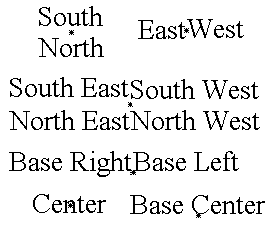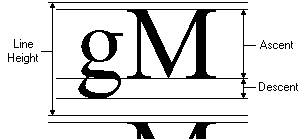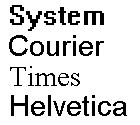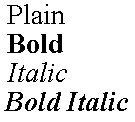Text
A raster text using a font with styles. The position the text is drawn depends on the text alignment attribute.
The library has at least 4 standard typefaces: "System" (which depends on the driver and platform), "Courier" (mono spaced with serif), "Times" (proportional with serif) and "Helvetica" (proportional without serif). Each typeface can have some styles: Plain, Bold, Italic and a combination of Bold and Italic. As an alternative to the standard typefaces, you can use other typefaces or native driver typefaces with the function NativeFont, but they may work in a reduced set of drivers.
You may retrieve the dimensions of the selected font with function GetFontDim. Also you may retrieve the bounding box of a specific text before drawing by using the GetTextSize and GetTextBox functions.
The text is drawn using a reference point; you can change the alignment relative to this point using the TextAligment function.
void cdCanvasText(int x, int y, const char* text); [in C]
void cdfCanvasText(double x, double y, const char* text); [in C]
void wdCanvasText(double x, double y, const char* text); (WC) [in C]
canvas:Text(x, y: number, text: string) [in Lua]
canvas:fText(x, y: number, text: string) [in Lua]
canvas:wText(x, y: number, text: string) (WC) [in Lua]
Inserts a text in (x,y) according to the current font and text alignment. It expects an ANSI string with no line breaks.
Attributes
void cdCanvasFont(const char* typeface, int style, int size); [in C]
void wdCanvasFont(const char* typeface, int style, double size); (WD) [in C]
canvas:Font(typeface, style, size: number) [in Lua]
canvas:wFont(typeface, style, size: number) (WD) [in Lua]
Selects a text font. The font type can be one of the standard type faces or other driver dependent type face. The style can be a combination of: CD_PLAIN, CD_BOLD, CD_ITALIC, CD_UNDERLINE or CD_STRIKEOUT. Only the Windows and PDF drivers support underline and strikeout. The size is provided in points (1/72 inch) or in pixels (using negative values).
Default values: "System", CD_PLAIN, 12.
To convert between pixels and points use the function cdPixel2MM to convert from pixels to millimeters and use the formula "(value in points) = CD_MM2PT * (value in millimeters)".
In WC, the size is specified in millimeters, but is internally converted to points.
Fonts can heavily benefit from the ANTIALIAS attribute where available in the driver.
|
Type Faces
|
Font Styles |
void cdCanvasGetFont(cdCanvas* canvas, char* typeface, int *style, int *size); [in C]
void wdCanvasGetFont(cdCanvas* canvas, char* typeface, int *style, double *size); (WC) [in C]
canvas:GetFont() -> (typeface: string, style, size: number) [in Lua]
canvas:wGetFont() -> (typeface: string, style, size: number) (WC) [in Lua]
Returns the values of the current font. It is not necessary to provide all return pointers; you can provide only the desired values.
In WC, the size is returned in millimeters.
char* cdCanvasNativeFont(cdCanvas* canvas, const char* nativefont); [in C]
canvas:NativeFont(font: string) -> (old_font: string) [in Lua]
Selects a font based on a string description. The description can depend on the driver and the platform, but a common definition is available for all drivers. It does not need to be stored by the application, as it is internally replicated by the library. The string is case sensitive. It returns the previous string.
The string is parsed and the font typeface, style and size are set according to the parsed values, as if cdCanvasFont was called. The native font string is cleared when a font is set using cdCanvasFont.
The common format definition is similar to the the Pango library Font Description, used by GTK+2. It is defined as having 3 parts: <font family>, <font styles> <font size>. For ex: "Times, Bold 18", or "Arial,Helvetica, Italic Underline, -24". Underline, Strikeout, and negative pixel values are not supported by the standard Pango Font Description. The supported styles include: Bold, Italic, Underline and Strikeout. The Pango format include many other definitions not supported by the CD format, they are just ignored.
The IUP "FONT" attribute internal formats are also accepted is all drivers and platforms.
Passing NULL as a parameter, it only returns the previous string and does not change the font. The value returned is the last attributed value, which may not correspond exactly to the font selected by the driver.
int cdCanvasTextAlignment(cdCanvas* canvas, int alignment); [in C]
canvas:TextAlignment(alignment: number) -> (old_alignment: number) [in Lua]
Defines the vertical and horizontal alignment of a text as: CD_NORTH, CD_SOUTH, CD_EAST, CD_WEST, CD_NORTH_EAST, CD_NORTH_WEST, CD_SOUTH_EAST, CD_SOUTH_WEST, CD_CENTER, CD_BASE_LEFT, CD_BASE_CENTER, or CD_BASE_RIGHT. Returns the previous value. Default value: CD_BASE_LEFT. Value CD_QUERY simply returns the current value.
Text Alignment

double cdCanvasTextOrientation(cdCanvas* canvas, double angle); [in C]
canvas:TextOrientation(angle: number) -> (old_angle: number) [in Lua]
Defines the text orientation, which is an angle provided in degrees relative to the horizontal line according to which the text is drawn. Returns the previous value. Value CD_QUERY simply returns the current value. The default value is 0.
Properties
void cdCanvasGetFontDim(cdCanvas* canvas, int *max_width, int *line_height, int *ascent, int *descent); [in C]
void wdCanvasGetFontDim(cdCanvas* canvas, double *max_width, double *height, double *ascent, double *descent); (WC) [in C]
canvas:GetFontDim() -> (max_width, max_height, ascent, descent: number) [in Lua]
canvas:wGetFontDim() -> (max_width, max_height, ascent, descent: number) (WC) [in Lua]
Returns the maximum width of a character, the line's height and the ascent and descent of the characters of the currently selected font. The line's height is the sum of the ascents and descents of a given additional space (if this is the case). All values are given in pixels. If the driver does not support this kind of query, the values will be given 0 (zero). It is not necessary to provide all return pointers, you can provide only the desired values and NULL for the others.
Font Dimension Attributes

void cdCanvasGetTextSize(cdCanvas* canvas, const char* text, int *width, int *height); [in C]
void wdCanvasGetTextSize(cdCanvas* canvas, const char* text, double *width, double *height); (WC) [in C]
canvas:GetTextSize(text: string) -> (width, heigth: number) [in Lua]
canvas:wGetTextSize(text: string) -> (width, heigth: number) (WC) [in Lua]
Returns the width and height of a text's minimum box with the currently selected font. If the driver does not support this kind of query, the values will be given 0 (zero). It is not necessary to provide all return pointers, you can provide only the desired values and NULL for the others.
void cdCanvasGetTextBox(cdCanvas* canvas, int x, int y, const char* text, int *xmin, int *xmax, int *ymin, int *ymax); [in C]
void wdCanvasGetTextBox(cdCanvas* canvas, double x, double y, const char* text, double *xmin, double *xmax, double *ymin, double *ymax); (WC) [in C]
canvas:GetTextBox(x, y: number, text: string) -> (xmin, xmax, ymin, ymax: number) [in Lua]
canvas:wGetTextBox(x, y: number, text: string) -> (xmin, xmax, ymin, ymax: number) (WC) [in Lua]
Returns the horizontal bounding rectangle of a text box, even if the text has an orientation. It is not necessary to provide all return pointers, you can provide only the desired values and NULL for the others.
void cdCanvasGetTextBounds(cdCanvas* canvas, int x, int y, const char *text, int *rect); [in C]
void wdCanvasGetTextBounds(cdCanvas* canvas, double x, double y, const char* text, double *rect); (WC) [in C]
canvas:GetTextBounds(x, y: number, text: string) -> (rect0, rect1, rect2, rect3, rect4, rect5, rect6, rect7: number) [in Lua]
canvas:wGetTextBounds(x, y: number, text: string) -> (rect0, rect1, rect2, rect3, rect4, rect5, rect6, rect7: number) (WC) [in Lua]
Returns the oriented bounding rectangle of a text box. The rectangle corners are returned in counter-clock wise order starting with the bottom left corner, (x,y) arranged (x0,y0,x1,y1,x2,y2,x3,y3).

